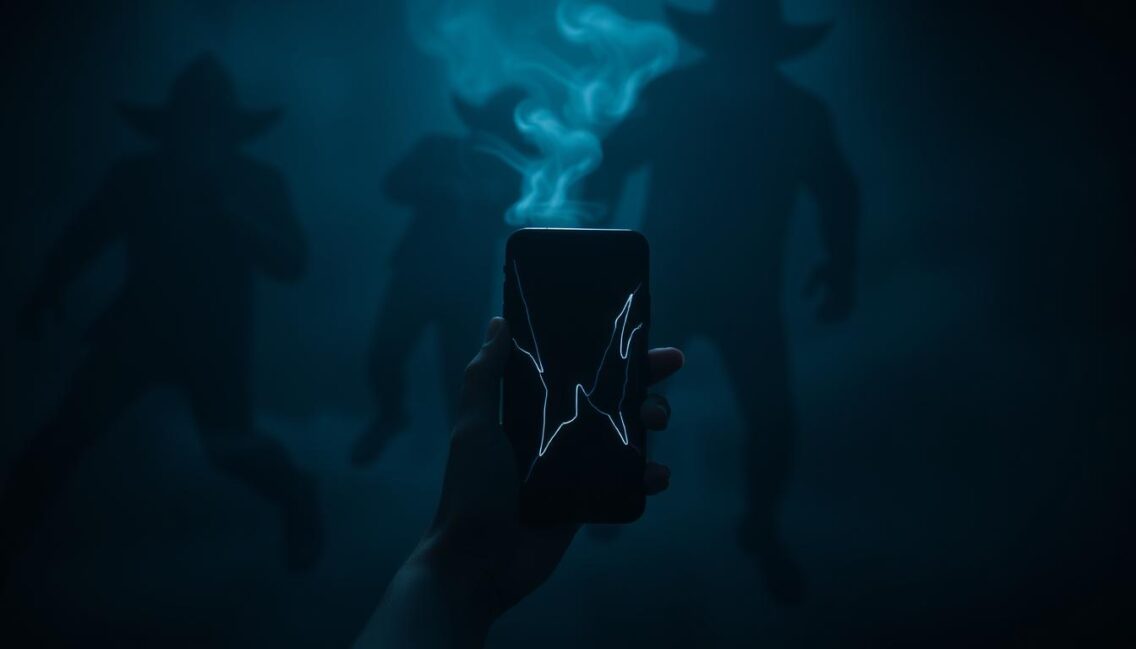Social Media Horror by David from New York

David, a young professional in New York, had a typical day. He scrolled through social media to escape daily stress. But, his digital indulgence turned into a terrifying nightmare.
While scrolling, David felt uneasy. Posts turned into hateful comments and personal attacks. The online spaces he loved became toxic, filled with trolls and cyberbullies.
David’s heart pounded as he tried to understand the chaos. He realized a simple social media session had turned into a nightmare. He knew he had to face the dark side of the internet to survive.
The Dark Side of Social Media Platforms Today
Social media is a big part of our lives, but there are serious issues to face. Cyberbullying and online harassment affect many. Also, toxic communities and content moderation failures are big problems.
Understanding Platform Algorithms and Their Impact
Algorithms are at the core of these issues. They aim to keep users engaged. But, they often promote content that’s harmful and divisive.
The Evolution of Online Toxicity
The internet has seen a rise in online toxicity. Trolls and extremists use social media to harm others. This makes online spaces unsafe for many.
Current State of Digital Communication
Digital communication is facing big challenges. Cyberbullying and online harassment are common. Platforms struggle to moderate content, leading to a bad online experience.
My Personal Encounter with Cyberbullying in New York
As *David from New York*, I never thought social media would turn dark. It started as a way to connect and share moments. But it quickly became a nightmare of *online harassment* and *digital trauma*.
It all began with snarky comments on my posts. They dismissed my opinions and made fun of my interests. I thought it was just harmless jokes. But the attacks grew stronger, with trolls sending me personal insults and threats.
The *cyberbullying* got worse, and I faced coordinated harassment. Rumors were spread, private info was leaked, and my reputation was attacked online. The emotional pain was too much, and I felt stuck in a cycle of *digital trauma*.
Dealing with this *online harassment* felt lonely and isolating. I tried to get help from moderators, but it was often not enough. The *cyberbullying* hurt my mental health, and I struggled to escape this nightmare.
Social Media Horror by David from New York: My Story
As *David from New York*, I’ve faced the dark side of social media. It began with simple comments and messages. These quickly turned into online harassment. The internet trolls kept sending me abusive and threatening messages.
The Initial Signs of Online Harassment
At first, I saw just a few negative comments. I thought it was nothing serious. But, these initial signs of online harassment were just the start. The trolls kept targeting me, using fake accounts to spread their malicious actions.
How the Situation Escalated
The online harassment got worse over time. The trolls started sharing my private info and making fake profiles in my name. The constant abusive messages and threats hurt my mental health. I was always on edge, worried about the next attack.
Breaking Point and Realization
The breaking point was when the trolls started targeting my loved ones. They pulled my friends and family into the social media horror I faced. It made me see how serious online harassment can be. I knew I had to act, but facing the internet trolls was scary.
The Psychology Behind Internet Trolls and Digital Abuse
It’s important to understand why internet trolls and digital abusers act the way they do. They often aim to hurt others’ feelings and mess with online groups. Knowing what drives them can help us fight back against online bullying.
Internet trolls want attention and to show they’re in charge. They get a kick out of making trouble and causing fights online. The internet’s anonymity lets them act out without worrying about getting caught.
Research shows that trolls might have traits like narcissism and a lack of empathy. They might see their victims as less than human and enjoy making them suffer. The bad communities they hang out in can make their bad behavior worse.
To make the internet safer, we need to get to the bottom of why trolls and abusers behave this way. By knowing their motivations, we can find better ways to stop them. This will help us create a digital world where people can connect and talk without fear.
Toxic Communities and Their Impact on Mental Health
The digital age has brought many challenges. One big problem is the rise of toxic communities online. These places, fueled by bad moderation and addiction to social media, harm our mental health a lot.
Identifying Harmful Online Behaviors
Cyberbullying and hate speech are common in these toxic communities. They thrive because people can hide their identities online. It’s important to spot signs like aggressive language and personal attacks. This helps us avoid these toxic communities.
The Long-term Effects of Digital Trauma
The effects of toxic communities on our mental health can last a long time. People who face harmful content moderation and social media addiction might feel more anxious, depressed, or stressed. It can also hurt our self-esteem and make us feel unsafe. We need to tackle these problems seriously.
Breaking Free from Toxic Online Environments
To improve our mental health, we need to take action. We can set limits, choose who we interact with online, and seek help from people we trust. By doing these things, we can take back control and have better online experiences.
Content Moderation: The Failed Promise of Safety
The digital world has changed fast, and so has the spread of harmful content on social media. Despite big promises, the truth is grim. Sites like Facebook, Twitter, and YouTube can’t keep up with all the bad stuff. This leaves users open to abuse, lies, and hate online.
Automated systems and human moderators face big challenges. Algorithms try to spot and remove bad content, but they often miss the mark. They can’t understand the complex meanings behind harmful words. Moderators, who review these cases, suffer a lot emotionally and mentally, making things worse.
Looking at content moderation’s failures, it’s clear we’re far from a safe online space. We need new tech, better policies, and a change in how platforms work. Until we get there, the internet will keep showing its darker side. Users will have to deal with the dangers of online hate.


